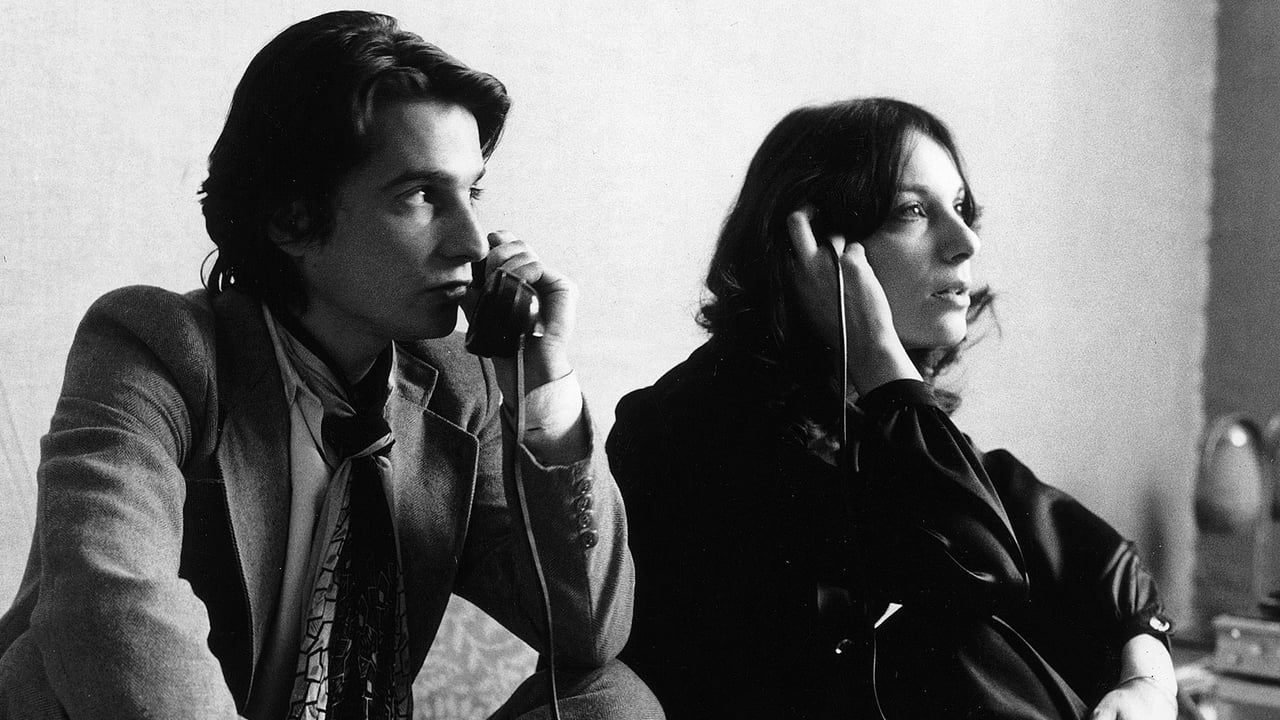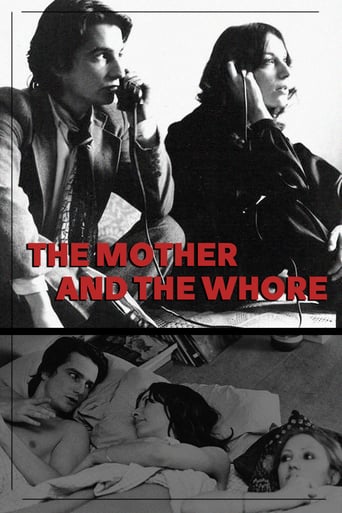

"La Maman et la putain" is the beautifulest film of all time. And what's most moving about it may be the relation between reality and art the movie deals with, which is directly inspired by Proust's "A la Recherche du temps perdu".Indeed, "La Maman et la putain" and "In search of lost time" apparently tell the same story : the one of the failure of love, which repeats itself endlessly. The first woman's name is always Gilberte, and the second woman appears like a twisted and deformed double of Gilberte : Veronika is like a "whore Gilberte", beautiful like the night, whereas Gilberte was pure, and "beautiful like the day". After the failure of the first love, a second love begins, but this one is like already doomed by the first one. Veronika takes the place of Gilberte, in Alexandre's life and in the movie. She progressively eclipses her, first by time to time, Gilberte's still coming when Alexandre waits for Veronika,then totally. That shows it's the same sad story repeating itself, the same "unfaithful woman", like Alexandre says, who appears endlessly - and unfaithful is for Proust the higher point in love, which makes it exist, but which also underlines its illusions.Art is what causes the passage between what's outside - the illusion of love - to what's inside, which is the truth, and is a learning of this truth. For instance, when Veronika notices the strange way Alexandre makes is bed, he answers that he saw it in a movie, and then, that a movie, "it's made for that, to learn how to live, how to make a bed". Alexander wants to live like he was in a film, he wants his life to be art. This conception of art comes from Proust, with whom Eustache shares the same rejection of "political art" and realism in art. "La Maman et la putain" fights against a conception of art "principaly political" - see for example the ironical review of a political movie by Alexandre. Like Proust says : "Art doesn't care for all this proclamations, and only exists in silence." First of all, art is introspection. And that also why realism or naturalism is rejected : art needs to transform reality to exist. Proust writes : "I discover the illusion of realism, which is a lie". That's why "La Maman et la putain" doesn't hide its artificiality, underlines by the way the actors "say" their text : "the more you seem artificial, the higher you go", said Eustache.Eustache and Proust both share this idea that the artist is a "translater" of a inner truth. But, Alexandre failed where Eustache succeed. "La Maman et la putain" tells us the failure of a character to be what he truly is. You can sens the tragedy arise when you go further in the movie, which becomes saddest. You can see it in the face of Alexandre, who looks more and more like a living-dead. You can see it by the fact that the scenes become longer, and that after a while, nothing happens outside. At the end of the movie, when you see Alexandre writing, and Veronika asking if he's writing his life,you can guess that he's not, that even literature failed. The end of the movie shows the symbolic death of Alexander, who is smashes by the heaviness of reality. And in this tiny nurse's room, Alexandre looks more like Albertine than Marcel.To explain this failure, we can say that Alexandre is a Balzac's reader. In "Forme et signification", Jean Rousset explains that, in Proust's, the readers of Balzac, who are Swann and Charlus, are unable of any artistic creation, because they're stuck in reality, which they mistake with art. They see reality in art and "are not aware of the transformations that necessarily exist between the life of an artist and his work, between reality and art". And that's exactly Alexandre. He claims for instance that he "loves a woman for parallel reasons, because she played in a Bresson's for example". He's like Swann, who falls in love with Odette because she looks like a Botticelli's woman."Life is perhaps not my vocation". This thought is indeed by Eustache, who committed suicide, even if it's said by Alexandre. Nevertheless, there is a difference between Alexandre and Eustache : if Eustache is absolutely Alexandre, Alexandre is like a double without art, a horrible vision of the artist, which crystallizes his fears.By fallowing Veronika at the end of the movie, Alexandre is condemned to illusions. It's death that remind me the last frames of the movie, in the face of Jean-Pierre Léaud as well as in the endless pucking of Veronika. Or maybe it is already hell that describes the end, like in Sarte's "Huit-Clot", and absolutely not like in the final liberation of "Le Temps retrouvé". If Eustache had read Proust, Alexandre could never have finish the book , always perturbed by life and Veronika when he tries to read it at his apartment or in the cafés. "La Maman et la Putain" is like a inverse double of "In search of lost times", which tells how Alexander doesn't become an artist, whereas "A la Recherche du temps perdu" tells how Marcel becomes a writer (Genette).If, like Baudelaire says, an artiste tells "reality at the light of his dream", it is his nightmare that Eustache tells us in "La Maman et la putain".
... View MoreIt is not an easy film to watch - it is over three and a half hours long and it is composed entirely of conversations. Yet it is so incredibly compelling and ruthlessly observational of the human character, that it is, in my humble opinion, one of the very greatest films of all time.The film is depressing, cynical and cruel. (If you want something uplifting, see Jacques Rivette's fantastic Céline and Julie Go Boating, which was made around the same time). It shows the idealism of the late 1960s to be nothing different from the society that it was trying to change.It involves a supposedly liberated ménage-à-trois between Alexandre (played by Jean-Pierre Leaud), Marie (Bernadette Lafont) and Veronika (Francoise Lebrun). Yet Alexandre is shown to be as chauvinistic and jealous as any other man. The women are exposed as being willingly subservient and defining their femininity through the male gaze.The film is an extremely icy end to the highly revolutionary French New Wave. This movement was one of the most significant movements in film history and had a profound effect on cinema as we know it. Jean-Pierre Leaud was one of the key actors of the New Wave, having starred (among other films) in the influential Les Quatres Cent Coups (1959) by Francois Truffaut as a rebellious teenager. Director Jean Eustache is not as well known as other directors from the New Wave, but he should be.There is no improvisation (unlike in John Cassavetes's similar films made in the US) and the dialogue comes from real-life conversations. The film is resonant with Eustache's personal experiences. For example, Francoise Lebrun was a former lover of Eustache. Eustache himself committed suicide in 1981 and the real-life person that the character Marie was based on, did too. The anger and bitterness all culminate in a harrowing monologue by Veronika delivered directly to the audience, breaking down the coldly objective nature of the rest of the film. This mesmerising, personal, and honest filmic statement remains one of the most revealing films of human nature around.
... View MoreWell, of course not, women are overly sensitive and needy on average, which is interestingly portrayed from mother to whore, though not pseudo-artistically, extravagantly, or blatantly dwelt on. Unlike many of you I have only seen La Maman et La Putain twice. As many good films, I noticed my opinion of it improved after a second viewing. All that I know is what I have seen and have yet to delve into further exploits until I myself have acquired the dvd. I have yet to figure out precisely why I enjoy this movie so much, but really, what do I care why? Though I'm sure I could and will form some wonderful explanation. All right, so you may disagree, perhaps it is a bit boring at times, I'm not an expert. The blonde reminds me of a lovely Grushenka.
... View MoreIf you enjoy French cinema then you are used to heavy dialogue and little action. Some ARE sleep-inducing, so the key is...BE AWAKE! Don't watch something like this on a small screen and without some degree of mental awakeness. I had the privilege of seeing this film within a festival and found it to be terrifically witty, sexy at points, and thought-provoking. I was engaged for nearly the entire length of the film, with the exception of a really protracted scene among the three principals towards the end. Anyway, boring is too easily said of long movies watched on videocassette. If you have some way of seeing it bigger, that's the way to catch it. And of all of Eustache's works the one I recommend most is Mes Petites Amoureuses ("My Little Loves") set in the world of children. Just amazing. Maybe someday it will be available for rent. It's very accessible and is as effective as Truffaut's Small Change.
... View More